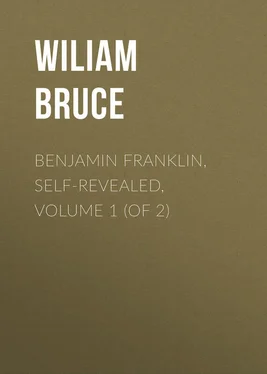Wiliam Bruce - Benjamin Franklin, Self-Revealed, Volume 1 (of 2)
Здесь есть возможность читать онлайн «Wiliam Bruce - Benjamin Franklin, Self-Revealed, Volume 1 (of 2)» — ознакомительный отрывок электронной книги совершенно бесплатно, а после прочтения отрывка купить полную версию. В некоторых случаях можно слушать аудио, скачать через торрент в формате fb2 и присутствует краткое содержание. Жанр: foreign_antique, foreign_prose, на английском языке. Описание произведения, (предисловие) а так же отзывы посетителей доступны на портале библиотеки ЛибКат.
- Название:Benjamin Franklin, Self-Revealed, Volume 1 (of 2)
- Автор:
- Жанр:
- Год:неизвестен
- ISBN:нет данных
- Рейтинг книги:5 / 5. Голосов: 1
-
Избранное:Добавить в избранное
- Отзывы:
-
Ваша оценка:
- 100
- 1
- 2
- 3
- 4
- 5
Benjamin Franklin, Self-Revealed, Volume 1 (of 2): краткое содержание, описание и аннотация
Предлагаем к чтению аннотацию, описание, краткое содержание или предисловие (зависит от того, что написал сам автор книги «Benjamin Franklin, Self-Revealed, Volume 1 (of 2)»). Если вы не нашли необходимую информацию о книге — напишите в комментариях, мы постараемся отыскать её.
Benjamin Franklin, Self-Revealed, Volume 1 (of 2) — читать онлайн ознакомительный отрывок
Ниже представлен текст книги, разбитый по страницам. Система сохранения места последней прочитанной страницы, позволяет с удобством читать онлайн бесплатно книгу «Benjamin Franklin, Self-Revealed, Volume 1 (of 2)», без необходимости каждый раз заново искать на чём Вы остановились. Поставьте закладку, и сможете в любой момент перейти на страницу, на которой закончили чтение.
Интервал:
Закладка:
The joke sometimes turns up when we are least expecting it, if it can be said that there is ever a time when a flash of wit or humor from Franklin surprises us. In a letter to Richard Price, asking him for a list of good books, such as were most proper to inculcate principles of sound religion and just government, he informs Price that, a new town in Massachusetts having done him the honor to name itself after him, and proposing to build a steeple to their meeting-house, if he would give them a bell, he had advised the sparing themselves the expense of a steeple for the present and that they would accept of books instead of a bell; "sense being preferable to sound." There is a gleam of the same sort in his revised version of the Lord's Prayer; for, almost incredible as the fact is, his irreverent hand tinkered even with this most sacred of human petitions. "Our Liturgy," he said, "uses neither the Debtors of Matthew, nor the indebted of Luke, but instead of them speaks of those that trespass against us . Perhaps the Considering it as a Christian Duty to forgive Debtors, was by the Compilers thought an inconvenient Idea in a trading Nation." Sometimes his humor is so delicate and subtle that even acute intellects, without a keen sense of the ludicrous, mistake it all for labored gravity. This is true of his modernized version of part of the first chapter of Job, where, for illustration, for the words, "But put forth thine hand now, and touch all that he hath, and he will curse thee to thy face," he suggests the following: "Try him; – only withdraw your favor, turn him out of his places, and withhold his pensions, and you will soon find him in the opposition." It is a remarkable fact that more than one celebrated man of letters has accepted this exquisite parody as a serious intrusion by Franklin into a reformatory field for which he was unfitted. We dare say that, if Franklin could have anticipated such a result, he would have experienced a degree of pleasure in excess of even that which he was in the habit of feeling when he had successfully passed off his Parable against Persecution on some one as an extract from the Bible.
There is undeniably a lack of reality, a certain sort of hollowness about his religious views. When we tap them, a sound, as of an empty cask, comes back to us. They are distinguished by very much the same want of spontaneous, instinctive feeling, the same artificial cast, the same falsetto note as his system of moral practice and his Art of Virtue . Indeed, to a very great degree they are but features of his system of morals. That he ever gave any sincere credence to the written creed of his youth, with its graded Pantheon of Gods, is, of course, inconceivable. This was a mere academic and transitional conceit, inspired by the first youthful impulses of his recession from extreme irreligion to lukewarm acquiescence in accepted religious conventions. Nor can we say that his belief in a single Deity was much more genuine or vital, confidently as he professed to commit himself to the wisdom and goodness of this Deity. There is nothing in his writings, full of well-rounded thanksgiving and praise as they sometimes are, to justify the conclusion that to him God was anything more than the personification, more or less abstract, of those cosmic forces, with which he was so conversant, and of those altruistic promptings of the human heart, of which he himself was such a beneficent example. The Fatherhood of God was a passive conception to which his mind was conducted almost solely by his active, ever-present sense of the Brotherhood of Man.
But it is no greater misconception to think of Franklin as a Christian than to think of him as a scoffer. He was no scoffer. A laugh or a smile for some ceremonious or extravagant feature of religion he had at times, as we have seen, but no laugh or smile except such as can be reconciled with a substantial measure of genuine religious good-faith. It was never any part of his purpose to decry Religion, to undermine its influence, or to weaken its props. He was too full of the scientific spirit of speculation and distrust, he was too practical and worldly-wise to readily surrender the right of private judgment, or to give himself over to any form of truly devotional fervor, but he had entirely too keen an appreciation of the practical value of religion in restraining human vices and passions and promoting human benevolence to have any disposition to destroy or impair its sway. The motive of his existence was not to unsettle men, nor to cast them adrift, nor to hold out to them novel projects of self-improvement, not rooted in fixed human prepossessions and experience, but to discipline them, to free them from social selfishness, to keep them in subjection to all the salutary restraints, which the past had shown to be good for them. Of these restraints, he knew that those imposed by Religion were among the most potent, and to Religion, therefore, he adhered, if for no other reason, because it was the most helpful ally of human morality, and of the municipal ordinances by which human morality is enforced. From what he said to Lord Kames, it seems that he regarded his Art of Virtue as a supplement to Religion, though really with more truth it might be asserted that it was Religion which was the supplement to his Art of Virtue .
Christians [he said] are directed to have faith in Christ, as the effectual means of obtaining the change they desire. It may, when sufficiently strong, be effectual with many: for a full opinion, that a Teacher is infinitely wise, good, and powerful, and that he will certainly reward and punish the obedient and disobedient, must give great weight to his precepts, and make them much more attended to by his disciples. But many have this faith in so weak a degree, that it does not produce the effect. Our Art of Virtue may, therefore, be of great service to those whose faith is unhappily not so strong, and may come in aid of its weakness.
How little Franklin was inclined to undervalue Religion as a support of good conduct is, among other things, shown by the concern which he occasionally expressed in his letters, when he was abroad, that his wife and daughter should not be slack in attending divine worship. One of his letters to Sally of this nature we have already quoted. Another to his wife expresses the hope that Sally "continues to love going to Church," and states that he would have her read over and over again the Whole Duty of Man and the Lady's Library. In another letter to his wife, he says: "You spent your Sunday very well, but I think you should go oftner to Church." Fortified as he was by his Art of Virtue , he felt that church attendance was but a matter of secondary importance for him, but he was eager that his wife and daughter, who had not acquired the habitude of the virtues as he had, should not neglect the old immemorial aids to rectitude.
Even to the levity, with which religious topics might be handled, he set distinct limits. He had no objection to a good-humored joke at the expense of their superficial aspects even if it was a little broad, but with malignant or derisive attacks upon religion he had no sympathy whatever. In the Autobiography , he denounces with manifest sincerity, as a wicked travesty, the doggerel version of the Bible, composed by Dr. Brown, who kept the inn, eight or ten miles from Burlington, at which he lodged overnight, on his first journey from Boston to Philadelphia. Nothing that he ever wrote is wiser or sounder than the letter which he addressed to a friend, dissuading him from publishing a "piece," impugning the Doctrine of a Special Providence. In its utilitarian conceptions of religion and virtue, in the emphasis placed by it upon habit as the best security for righteous conduct, in the cautious respect that it manifests for the general sentiments of mankind on religious subjects, we have a concise revelation of his whole attitude towards Religion, when he was turning his face seriously towards it.
Читать дальшеИнтервал:
Закладка:
Похожие книги на «Benjamin Franklin, Self-Revealed, Volume 1 (of 2)»
Представляем Вашему вниманию похожие книги на «Benjamin Franklin, Self-Revealed, Volume 1 (of 2)» списком для выбора. Мы отобрали схожую по названию и смыслу литературу в надежде предоставить читателям больше вариантов отыскать новые, интересные, ещё непрочитанные произведения.
Обсуждение, отзывы о книге «Benjamin Franklin, Self-Revealed, Volume 1 (of 2)» и просто собственные мнения читателей. Оставьте ваши комментарии, напишите, что Вы думаете о произведении, его смысле или главных героях. Укажите что конкретно понравилось, а что нет, и почему Вы так считаете.










![Benjamin Franklin - Memoirs of Benjamin Franklin; Written by Himself. [Vol. 2 of 2]](/books/747975/benjamin-franklin-memoirs-of-benjamin-franklin-wr-thumb.webp)
![Benjamin Franklin - Memoirs of Benjamin Franklin; Written by Himself. [Vol. 1 of 2]](/books/748053/benjamin-franklin-memoirs-of-benjamin-franklin-wr-thumb.webp)
